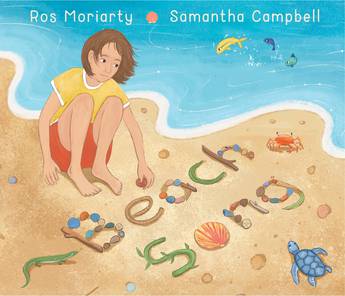Employing lyrical language ‘Beach Song’ celebrates the wonderous experience of exploring the coast and the sea through the senses. Each double page spread details through its poetic text and colourful illustrations the sensual, tactile, visual and auditory aspects of the landscape and lifeforms found in the sea, rockpools and sand of an Australian beach.
The multiple use of the word ‘I’ provides a link between the reader and the pictured child as they describe what they are doing and observing. ‘I see what the fish sees .…’ ‘I glide like the fish glides’. Each spread focuses on a different creature as the child copies and responds to their observations. In rockpools, for example, they ‘see what the periwinkle sees’ and ‘I grip like the periwinkle grip.’ As the child mimics the activities of the creatures, the reader gains a deeper understanding of the joy and love the child is feeling through the use of richly descriptive language. The story offers beautifully crafted alliteration, similes and onomatopoeia. Examples include they duck and dive in the water, they soar like the seagull. The sensual nature of the language creates an almost interactive feel. An excellent book for sharing with children to develop a sense of wonderment of the natural world and to build the language skills of students.
The artwork, created using digital pastels and pencils, offers soft colours and expands further the book’s descriptive text.
Ros Moriarty grew up in wild pristine places in lutruwita/Tasmania which inspired her love of writing about the natural world. She is the founder of Indi Kindi pre-literacy education and has written several picture books for early childhood that involve the natural world and can be found in this database. Samantha Campbell is descended from the Dagoman people from Katherine and has lived in remote Indigenous communities across the Top End.

